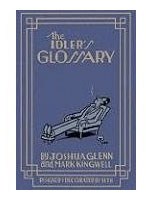 My friend Josh Glenn has a new book, The Idler’s Glossary
My friend Josh Glenn has a new book, The Idler’s Glossary [amazon]. An acquaintance of mine, Mark Kingwell, wrote the introductory essay. And Seth did the illustrations. (I love Seth.) The whole svelte, 3.7 x 6 in. unit would slip snugly into someone’s X-Mas stocking, mayhap.
It’s a glossary: entries on absentmindedness and acedia through to working-class hero. (Shouldn’t there be an entry for ‘zzzzzz’? With no gloss? I think that might have been an elegant way to end the book.)
Right, the philosophy of idleness. First, I will note that Kingwell and Glenn have diametrically opposed theories of boredom. Kingwell quotes a passage from a Kingsley Amis novel: “My wife accuse me of thinking her boring. It doesn’t seem to have occurred to her that this might be because she’s boring … To her mind, her being boring is a thing I do.” Kingwell takes the husband’s side, but Glenn goes on to take the wife’s: “Go ahead and blame your dull companions, but being bored [a slang term that appeared among London’s smart set in the late 18th century, perhaps derived from the French for ‘triviality’] is your own fault. It’s the state of being too restless to concentrate, while too apathetic to bust a move.” Which, come to think of it, is a pretty stable Kinglsey Amis formula.
So who’s right: Kingwell or Glenn? In philosophical terms, if a tree is boring in the forest, and there is no one there to be bored by how dull Nature is … ? In Humean terms, is boringness a matter of (we shouldn’t say ‘gilding and staining Nature with our sentiments’) dulling and drearing Nature with our sentiments. Or was existence already dull and drear when we lay down on it?
Let us proceed to our second topic, which is of even greater significance: idleness, per se. [click to continue…]